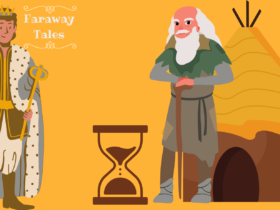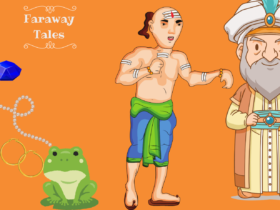|| An Indian folktale ||
In a certain village there lived ten cloth merchants, who always went about together. Once they had travelled far to conduct business and were returning home with a great deal of money which they had obtained through their trade.
Now there happened to be a dense forest near their village. It was an hour before sunrise by the time they reached this forest. In the forest there lived three notorious robbers. But these ten merchants had not heard of these robbers. They did not carry any weapons or protection of any kind.
While they were walking in the forest, suddenly the robbers stood before them, with swords and cudgels in their hands, and ordered them to lay down all their belongings.
Since the traders had no weapons with them, even though they were many more in number, they had to submit themselves to the robbers.
The robbers took away everything from them, even their clothes. They gave each merchant only loin-cloth a feet in length and a feet in breadth.
Instead of going away with the riches, the robbers became arrogant that they had complete control over ten educated men. They wanted to embarass them and prove that they were superior.
They seated themselves like three monarchs before the men they had plundered, and ordered them to dance to them. The merchants now mourned their fate. They had lost all they had, except their loin-cloth, and still the robbers were not satisfied, but ordered them to dance.
This was downright humiliating!
One of the ten merchants was very clever. He thought and thought on how they can overpower the robbers. They were ten against three robbers.
If they could somehow work together, they might succeed.
Once the dance began, he observed that the robbers had placed their weapons on the ground and began to laugh and make fun of the dance.
He took the lead in the dance, and, as a song is always sung by the leader on such occasions, to which the rest keep time with hands and feet, he thus began to sing:
“We are enty men,
They are erith men:
If each erith man,
Surround eno men
Eno man remains.
Tâ, tai, tôm, tadingana.”
The traders have a secret language through which they communicate for a sale or negotiation. Enty means ten, erith means three, eno means one.
The man was trying to say that three men restrain each robber and one man will be remaining to capture the weapons. He repeated the verse thrice before all the ten merchants understood.
The three thieves, glorying in their victory had no understanding the meaning of the song and the intentions of the dancers. They were proudly seated chewing betel and tobacco and laughing at the awkward dancers.
Meanwhile the song was sung a fourth time. Tâ tai tôm had left the lips of the singer; and, before tadingana was out of them, the merchants separated into groups of three, and each group attacked one thief.
The robbers were taken by surprise and were held by three men each while the remaining merchant, the singer himself, tore strips of their cloth and tied their hands and feet.
Once the robbers were securely tied, they took back their own clothes and money. They took the robbers’ weapons too in case the robbers were to somehow become free and pursue them with weapons.
They left the robbers tied and went back to their home. The nine merchants praised their clever merchant friend whose thoughtfulness and presence of mind saved them all.
Like (0)







Leave a Reply